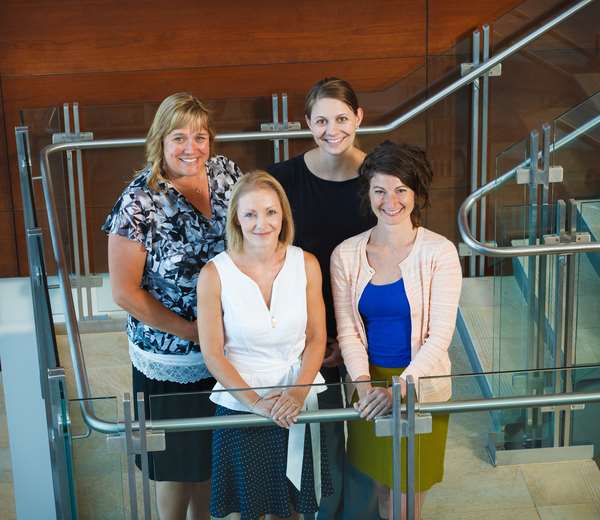
Nikki Johnston, PhD
Professor, Otolaryngology & Communication Sciences and Microbiology & Immunology
Locations
- Otolaryngology & Communication Sciences
Contact Information
Education
BS, Anatomical Sciences, University of Dundee, United Kingdom, 1999
Honors and Awards
Charles Ferguson Clinical Research Prize, American Society of Pediatric Otolaryngology - March 2013
2012 Faculty Service Award for service to the Faculty Council Committees of the MCW - October 2012
Marquis Who’s Who in America 2013 - January 2012
Marquis Who’s Who in Medicine and Healthcare 2012 - June 2011
American Cancer Society / MCW Cancer Center Travel Award, to attend and present at the annual AACR conference, Orlando, Florida - March 2011
Broyles-Maloney Award, American Broncho-Esophagological Association, Phoenix, Arizona - May 2009
Broyles-Maloney Award, American Broncho-Esophagological Association, Orlando, Florida - May 2008
Best Abstract and Travel Award, The Union of European Gastroenterology Week, Copenhagen, Denmark - July 2005
Key Note Presentation, World Organization for Specialized Studies on Disease of the Esophagus, Paris, France - September 2003
Best Abstract and Travel Award, The Union of European Gastroenterology Week, Geneva, Switzerland - October 2002
Research Interests

Research Focus
- Extraesophageal reflux
- Use of pepsin as a marker for extraesophageal reflux
- Uptake of pepsin by laryngeal epithelial cells & its role in reflux - attributed laryngeal injury & disease
- Isolate and identification of the receptor with which pepsin interacts on laryngeal epithelial cells
- New therapeutics for reflux (pepsin inhibitors/receptor antagonists)
- Role of reflux, specifically pepsin, in laryngopharyngeal cancers
- Role of pepsin in Barrett’s esophagus and esophageal adenocarcinoma
Dr. Johnston’s research laboratory aims to test pepsin, as a marker for reflux, in clinical tissue and secretion samples from patients with diseases of the upper airway, demonstrate the effect of nonacid pepsin on respiratory epithelium using in vitro and in vivo models, and identify the molecular signaling pathways through which nonacid pepsin elicits cell damage. She has been investigating the role of reflux, specifically pepsin, in injury and disease of the aero-digestive tract for several years now. Dr. Johnston has presented this work at national and international scientific and clinical meetings and directed two international conferences on extra-esophageal reflux disease, the future: diagnosis and treatment. She has published the data in several peer reviewed journals, contributed chapters for reflux-related books, and edited a book on this subject.
In addition to investigating the role of pepsin as a diagnostic marker for reflux and its role in the pathophysiology of reflux-attributed inflammatory disease, her group has highlighted a potential role for pepsin in carcinogenesis of the laryngopharynx. Her research team is currently performing experiments to elucidate pepsin as a promoter/causal agent involved in early events of carcinoma in the laryngopharynx, and to investigate the mechanism by which pepsin causes/contributes to inflammation and carcinogenesis in the laryngopharynx.
Society Memberships
- American Association for Cancer Research
- Society for Bimolecular Sciences
- Association for Research in Otolaryngology
- American Broncho-Esophagological Association
- Medical College of Wisconsin Cancer Center
- Clinical and Translational Science Institute of Southeast Wisconsin
Publications
-
(Ergun P, Samuels TL, Mathison AJ, Liu T, Jin VX, Johnston N.) Int J Mol Sci. 2025 Jun 26;26(13) PMID: 40649959 PMCID: PMC12250232 SCOPUS ID: 2-s2.0-105010318417 07/13/2025
-
Unveiling the Silent Struggle: A Comprehensive Guide to Laryngopharyngeal Reflux Disease.
(Husain IA, Johnston N.) Otolaryngol Clin North Am. 2025 Jun;58(3):xv-xvi PMID: 40185652 SCOPUS ID: 2-s2.0-105001827920 04/05/2025
-
Pepsin, Mucosal Injury, and Pathophysiology of Non-acid Reflux.
(Samuels TL, Johnston N.) Otolaryngol Clin North Am. 2025 Jun;58(3):415-432 PMID: 40148170 SCOPUS ID: 2-s2.0-105001138800 03/28/2025
-
(Dey S, Jadcherla A, Johnston N, Bock JM, Garcia GJM.) Journal of Aerosol Science. September 2025;189 SCOPUS ID: 2-s2.0-105009433292 09/01/2025
-
(Ergun P, Samuels TL, Mathison AJ, Liu T, Jin VX, Johnston N.) International Journal of Molecular Sciences. July 2025;26(13) SCOPUS ID: 2-s2.0-105010318417 07/01/2025
-
Advances in laryngopharyngeal reflux: Etiology, diagnosis, and management.
(Samuels TL, Aoun J, Husain I, Figueredo E, Richards D, Johnston N.) Ann N Y Acad Sci. 2024 Nov;1541(1):53-62 PMID: 39420555 SCOPUS ID: 2-s2.0-85206825163 10/18/2024
-
(Ergun P, Samuels TL, Mathison AJ, Plehhova K, Coyle C, Horvath L, Johnston N.) Int J Mol Sci. 2024 Oct 05;25(19) PMID: 39409043 PMCID: PMC11605242 SCOPUS ID: 2-s2.0-85206446606 10/16/2024
-
17β-estradiol Attenuates the Middle Ear Inflammatory Response to Nontypeable Haemophilus influenzae.
(Khampang P, Samuels TL, Blaine-Sauer S, Lucas J, Yan K, Johnston N, Kerschner JE.) Laryngoscope. 2024 Aug;134(8):3815-3819 PMID: 38401061 SCOPUS ID: 2-s2.0-85186458928 02/24/2024
-
The Dubai Definition and Diagnostic Criteria of Laryngopharyngeal Reflux: The IFOS Consensus.
(Lechien JR, Vaezi MF, Chan WW, Allen JE, Karkos PD, Saussez S, Altman KW, Amin MR, Ayad T, Barillari MR, Belafsky PC, Blumin JH, Johnston N, Bobin F, Broadhurst M, Ceccon FP, Calvo-Henriquez C, Eun YG, Chiesa-Estomba CM, Crevier-Buchman L, Clarke JO, Dapri G, Eckley CA, Finck C, Fisichella PM, Hamdan AL, Hans S, Huet K, Imamura R, Jobe BA, Hoppo T, Maron LP, Muls V, O'Rourke AK, Perazzo PS, Postma G, Prasad VMN, Remacle M, Sant'Anna GD, Sataloff RT, Savarino EV, Schindler A, Siupsinskiene N, Tseng PH, Zalvan CH, Zelenik K, Fraysse B, Bock JM, Akst LM, Carroll TL.) Laryngoscope. 2024 Apr;134(4):1614-1624 PMID: 37929860 SCOPUS ID: 2-s2.0-85168811976 11/06/2023
-
Inhaled fosamprenavir for laryngopharyngeal reflux: Toxicology and fluid dynamics modeling.
(Lesnick A, Samuels TL, Seabloom D, Wuertz B, Ojha A, Seelig D, Ondrey F, Wiedmann TS, Hogan C, Torii E, Ouyang H, Yan K, Garcia GJM, Bock JM, Johnston N.) Laryngoscope Investig Otolaryngol. 2024 Feb;9(1):e1219 PMID: 38362183 PMCID: PMC10866582 02/16/2024
-
Inhaled fosamprenavir for laryngopharyngeal reflux: Toxicology and fluid dynamics modeling
(Lesnick A, Samuels TL, Seabloom D, Wuertz B, Ojha A, Seelig D, Ondrey F, Wiedmann TS, Hogan C, Torii E, Ouyang H, Yan K, Garcia GJM, Bock JM, Johnston N.) Laryngoscope Investigative Otolaryngology. February 2024;9(1) SCOPUS ID: 2-s2.0-85183005384 02/01/2024
-
Establishment of novel immortalized middle ear cell lines as models for otitis media.
(Blaine-Sauer S, Samuels TL, Khampang P, Yan K, McCormick ME, Chun RH, Harvey SA, Friedland DR, Johnston N, Kerschner JE.) Laryngoscope Investig Otolaryngol. 2023 Oct;8(5):1428-1435 PMID: 37899851 PMCID: PMC10601576 10/30/2023

